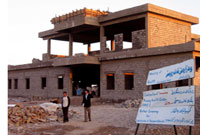|
Despite the reality that it has become too dangerous for most NGOs to continue their work in Iraq, WiRED's programs in the war-torn country are gaining momentum as critical resources for the Iraqi medical community.
 Primary Health Care facilities
Primary Health Care facilities
under construction.
This November, WiRED executive director Gary Selnow had the opportunity to survey WiRED's efforts in Iraq—namely, the extension of the Medical Information Center (MIC) program to 39 facilities; the addition of a critical telemedicine component (T/Ms), which will allow medical educators to "visit" Iraqi medical schools; and the advancement of several programs that, if funding can be found, will enable WiRED to expand assistance to the medical community and the people of Iraq.
WiRED's help in Iraq is needed now more than ever. Selnow—recounting the story of a young Iraqi boy, who, in lieu of shaking Selnow's hand instead threw him a salute—believes that, "If the US is to have a positive impact on that society, apart from military involvement, we must demonstrate that we have much to offer in the way of education, medical assistance and other humanitarian contributions. The Iraqis need to define us by a more inclusive spectrum of Americans."
While in Iraq, Selnow made final arrangements with WiRED's Iraqi technical staff for the installation of the four T/Ms. The equipment is now in Basrah, Mosul, Erbil and Baghdad, where WiRED's technicians are testing the equipment and will install all facilities by mid-December. Twenty additional MICs are being prepared for installation as well. WiRED's grant for the T/M project includes no funding for connect time, and a Telemedicine Center with no connect time is like an automobile without gasoline. So to deal with this, WiRED will share bandwidth among the four facilities, squeeze its equipment and installation budget to purchase three months of connect time, and continue to seek support for 12 months of connect time from various USG agencies and other funders.
Selnow is also pleased to report that the equipment purchase agreements are completed and the new MICs will be installed over the next four months. The project is being coordinated with the Iraqi Ministry of Health.
WiRED's success in Iraq thus far has generated interest in future projects. Working with several US-based organizations, WiRED plans to set up a medical training facility. Set in northern Iraq, the Learning Center will provide a range of training programs for physicians and nurses based throughout the country. Kurdish medical school officials show great interest in such a facility. Also on the project drawing board are Primary Healthcare facilities (PHCs). The USG is constructing 142 PHCs throughout Iraq, each with 50-90 diagnostic and treatment rooms staffed by doctors already practicing in the community. The PHCs will handle most medical needs except for surgery and critical cases. Missing from the PHC program, however, is connectivity. For a fraction of the cost of brick and mortar, connectivity would transform the PHCs into a robust medical network. With adequate funding, WiRED can aid in this transformation.
WiRED wishes to thank the U.S. Department of State, The Medtronic Foundation, Pfizer Inc, Affinity Inc., the Christopher Reeve Paralysis Foundation and many private donors who have contributed funds for our work in Iraq.
^ Back to the Top
|



